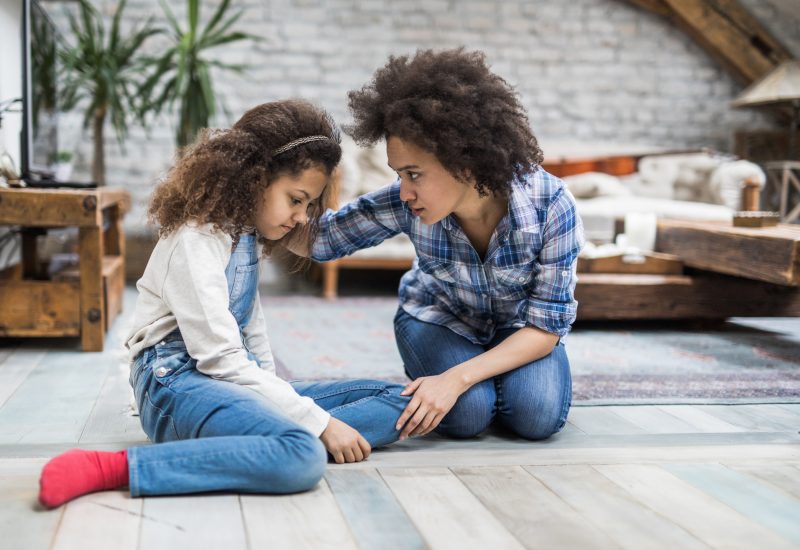 This past year has been anything but easy for parents and families alike. With an ongoing pandemic, there’s no better time than now to begin practicing self-care and wellness strategies to promote resilience in children. Resilience teaches kids the skills to cope, how to recover from hardships with confidence and optimism, and better prepares them for future challenges.
This past year has been anything but easy for parents and families alike. With an ongoing pandemic, there’s no better time than now to begin practicing self-care and wellness strategies to promote resilience in children. Resilience teaches kids the skills to cope, how to recover from hardships with confidence and optimism, and better prepares them for future challenges.
“The world can be a scary place, and it’s not always possible to shield our children from every disaster,” said Dr. Georgette Constantinou, PhD, pediatric psychologist at Akron Children’s. “There are many events such as COVID-19, death, divorce, natural disasters that could affect our children throughout their lives. It’s our job to equip kids with the tools they need to navigate successfully anything that may come their way.”
Dr. Constantinou strongly believes in the 7 Cs of resilience, developed by pediatrician Dr. Kenneth Ginsburg and the American Academy of Pediatrics in the book, “A Parent’s Guide to Building Resilience in Children and Teens: Giving Your Child Roots and Wings.” Read on to learn more about these essential building blocks of resilience to help your children succeed in the game of life.
- Build COMPETENCE in kids so they believe they can handle any difficult situation.
- Point out your children’s strengths and abilities, and avoid comparisons with other siblings.
- Empower your kids to make their own decisions, when appropriate.
- Allow kids to experience discomfort, instead of jumping in too quickly to solve the problem. It will help them learn to work through it and develop their own problem-solving skills.
- Build CONFIDENCE and the belief in your children that they can problem solve on their own.
- Praise your children when they have done something well. Just be sure you praise real accomplishments and not something that lacks authenticity.
- Model self-compassion by forgiving yourself and focusing on the good in yourself.
- Encourage your children to go outside their comfort zone, like trying a new sport or participating in the school play. It will help them realize they are strong enough to handle a challenge.
- Build a strong emotional CONNECTION with your children. The assurance of your unconditional love and support gives kids the security to stand on their own.
- Spend quality time together, such as going for a walk, playing games or eating meals together.
- Create a ‘safe zone’ in your home where your children feel comfortable sharing with you anything that’s on their mind.
- Ensure your children feel physical safety and emotional security at home. Kids can better handle the outside world with a safe home base.
- Build CHARACTER with a solid set of family morals and values to help kids determine right from wrong.
- Point out how your children’s behaviors affect others.
- Model a caring attitude and empathy toward others by understanding their thoughts, feelings and behaviors. Avoid judging, stereotyping or gossiping about others.
- Encourage your children to embrace their mistakes to promote growth and learn from them.
- Build a sense of purpose by CONTRIBUTING to the well-being of others. When kids see the importance of their contributions, they may be motivated to take action and improve their surroundings.
- Model generosity by serving others in need, and create opportunities for your child to serve, too.
- Communicate and even show your children that some families don’t have everything they need.
- Build healthy COPING skills to prepare kids for life’s difficult situations.
- Teach your children positive coping strategies, such as deep breathing exercises, stretching or squeezing a stress ball.
- Instead of lecturing to teach your children how to handle difficult situations, bounce questions back to them. It will help them think through the problem and come up with their own solutions.
- Model optimism and how to look for the positive in any situation.
- Build a sense of CONTROL and accountability. Kids who understand privileges and respect are earned by showing responsibility will be more likely to make wise choices.
- Point out that many life events are caused by a person’s choice or action.
- Use discipline to teach your children, as opposed to punishing or controlling them. It will help them understand their actions produce certain consequences.
- Guide your children to focus on things they can change and what they can do to change it.
“Modeling these strategies is the most important way to help kids build resilience,” said Dr. Constantinou. “Showing children the way is more important than anything we can say to help them navigate obstacles they encounter as they grow.”
Akron Children’s offers a Psychiatric Intake Response Center (PIRC) 24 hours a day, 7 days a week. It’s a triage and referral service that links families to behavioral health services. It is staffed by licensed social workers and professional clinical counselors who are trained to assess a child’s mental, emotional and behavioral healthcare needs. To contact PIRC, call 330-543-7472.
If you are in crisis, please call the National Suicide Prevention Lifeline at 1-800-273-8255(TALK) or contact the Crisis Text line by texting 4HOPE to 741741.
Learn more about the steps Akron Children’s is taking to keep you and your family safe during the pandemic.








